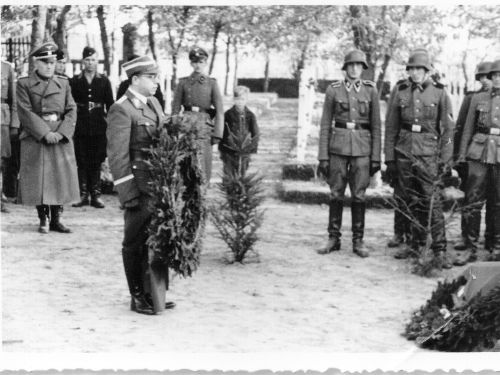Werner Blankenburg

Chelm Cemetery - Werner Blankenburg at the Funeral of Sobibor NCO's October 1943 (USHMM)
Werner Blankenburg was born in Caputh, Brandenburg, on June 19, 1906. A member of the Nazi Party and SA since 1929, he worked as a sales representative before joining the Fuhrer's Chancellery. Despite becoming a member of the Nazi Party at a relatively early date, Blankenburg had held no previous post in the Party, although he had achieved the rank of SA Oberfuhrer. Werner Blankenburg had been recruited from private business in order to become a senior member of the T4 staff, in his case to be head of Amt lla of the Fuhrer's Chancellery, one of the sub-divisions responsible for the implementation of the euthanasia operation. His immediate superior, and overall head of Amt ll was Viktor Brack. Blankenburg was Brack's permament deputy and in the latter's absence conducted the affairs of Amt ll and he was thus completely immersed in the criminal activities of the Fuhrer's Chancellery in general and of T4 in particular.
After Viktor Brack left the Fuhrer's Chancellery for front-line service in the SS-Prinz Eugen Division in 1942, Blankenburg succeeded him as the day to day manager of T4. Brack had been corresponding with RFSS- Heinrich Himmler concerning the possibility of the use of X-rays for the mass sterilization of Jews. When Himmler showed interest in the proposal directing that the method be tried in at least one concentration camp, Blankenburg replied to him in August 1942: 'As permanent deputy of Oberfuhrer Brack I shall immediately take the necessary measures and get in touch with the Chiefs of the Main Offices for the Concentration Camps.' Some 20 months later, Blankenburg again wrote to Himmler explaining that the method had not been successful, and that 'operative castration requires not more than 6-7 minutes and can therefore be performed more reliably and quicker than the castration by X-rays.' Blankenburg concluded by assuring Himmler that he would soon be able to submit a report on the continuation of this work.
Werner Blankenburg also played a role in the Aktion Reinhardt mass murder programme. Franz Suchomel, an SS-NCO at Treblinka recalled Blankenburg's visits to Treblinka; 'Blankenburg, on the occasion of his visits, repeatedly explained that everyone had been put there for the purpose of carrying out the operation, and that there was no point in transferring away.'
Max Czichotzki, also known as Max Runhof, an Adjutant of Odilo Globocnik in Lublin, testified in Wiesbaden during 1961 that:
'On this night a man called Blankenburg came from Berlin from the Chancellery - he came with a truck, which was full of suitcases and Blankenburg told me he had Odilo Globocnik's permission to store all the suitcases for safe keeping in the cellars. I didn't want to give permission and rang the Fuhrer's headquarters. and Greitman (possibly Grothmann) said it's okay. I had to clear out a room in the cellar and a man, Natke helped. Also two police ordnances worked for us and lots of cases were left in the cellar.'
Max Runhof later added that:
'During the loading I watched from behind a window and saw that one of the containers was damaged and the contents - items of gold - rolled over the ground. The items were gathered up and put back. This incident made it clear to me that these valuable items must have come from the persecution measures against the Jews.'
Franz Suchomel also recalled in a post war interview with Gitta Sereny:
'A messenger arrived from Berlin with a suitcase and orders from Werner Blankenburg, to return with one million marks. We crammed a million into it, and he went off with it to Berlin.' .
Werner Blankenburg and Dieter Allers attended the funeral at the Chelm cemetery of the SS-Nco's murdered during the Sobibor death camp revolt, in October 1943.
In April 1945, Werner Blankenburg was evacuated from Berlin to Bavaria with other members of the Fuhrer's Chancellery. When the Second World War ended he adopted the identity of Werner Bieleke - his wife's maiden name - and lived in the Wangen district of Stuttgart. He worked as a bank clerk in Ludwigsburg, and later as a representative for a textile company in Freudenstadt. Despite being on a 'most wanted' list of war criminals from 1945, until the time of his death, he managed to escape arrest, even keeping in contact with his parents in an old people's home in Ulm, as well as with former T4 colleagues.
At the request of his wife, Werner Blankenburg had been officially declared dead by a magistrates' court in Berlin-Tempelhof in 1956. The date of his death was given as December 31, 1945. In 1950, however, the Stuttgart Kriminalpolizei began to take an interest in the wartime activities of Herr Werner Bieleke, and he quickly disappeared into the Swabian Alps, south of the city. There he sought refuge with a former T4 comrade in the market town of Munsingen. He returned to Stuttgart about a year later to resume his previous occupation. Werner Blankenburg died in Stuttgart-Wangen on November 28, 1957, and is buried there under the name Werner Bieleke. At the funeral service numerous former T4 members were present, among them Dieter Allers, and Erwin Lambert, who helped build the gas chambers at T4 institutions and the gas chambers at Sobibor and Treblinka death camps.
Sources:
M. Conroy, Nazi Eugenics, Ibidem-verlag, Stuttgart 2017
G. Sereny, Into That Darkness, Pimlico, London 1974
J. Poprzeczny, Hitler’s Man in the East – Odilo Globocnik, McFarland, Jefferson 2004
Fotos Aus Sobibor, Metropol, Berlin, January 2020
© Holocaust Historical Society March 13, 2020

